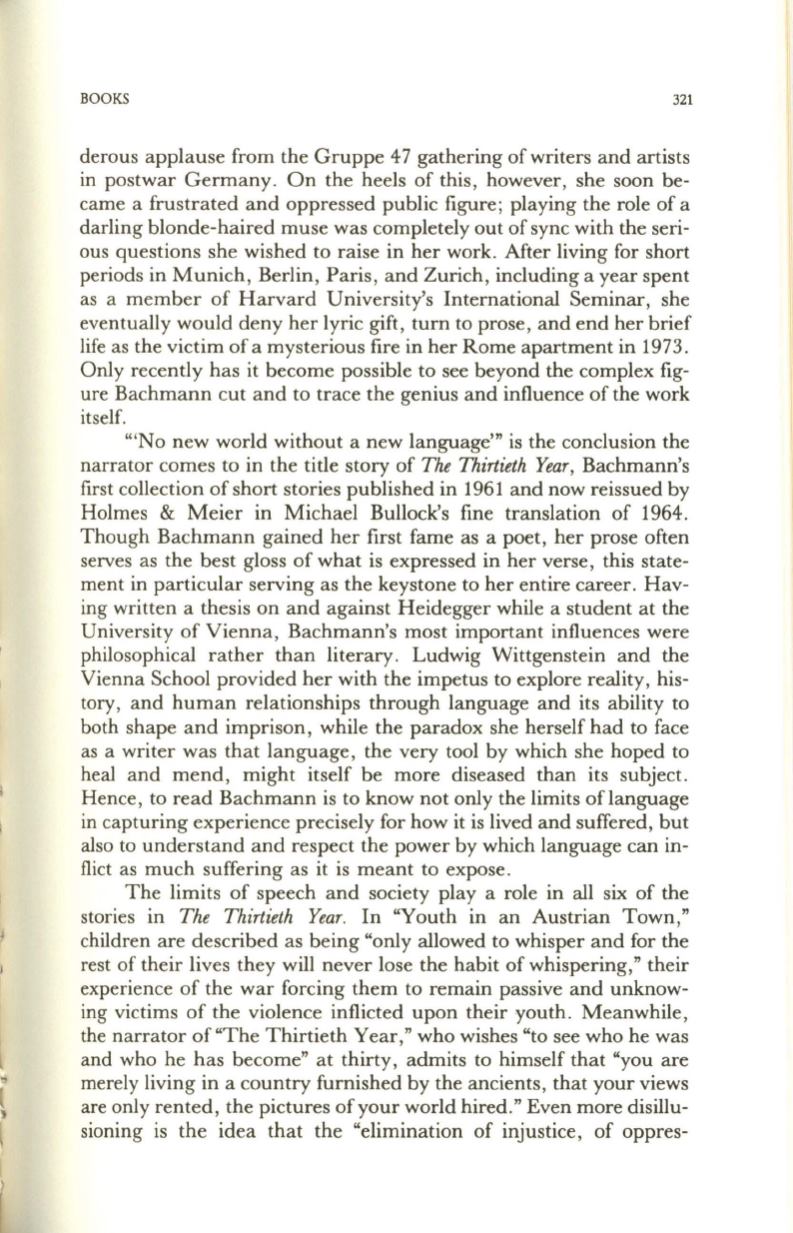
BOOKS
321
derous applause from the Gruppe 47 gathering of writers and artists
in postwar Germany . On the heels of this, however, she soon be–
came a frustrated and oppressed public figure; playing the role of a
darling blonde-haired muse was completely out of sync with the seri–
ous questions she wished to raise in her work. After living for short
periods in Munich, Berlin, Paris, and Zurich, including a year spent
as a member of Harvard University's International Seminar, she
eventually would deny her lyric gift, turn to prose, and end her brief
life as the victim of a mysterious fire in her Rome apartment in 1973 .
Only recently has it become possible to see beyond the complex fig–
ure Bachmann cut and to trace the genius and influence of the work
itself.
"'No new world without a new language'" is the conclusion the
narrator comes to in the title story of
The Thirtieth Year,
Bachmann's
first collection of short stories published in 1961 and now reissued by
Holmes
&
Meier in Michael Bullock's fine translation of 1964.
Though Bachmann gained her first fame as a poet, her prose often
serves as the best gloss of what is expressed in her verse , this state–
ment in particular serving as the keystone to her entire career. Hav–
ing written a thesis on and against Heidegger while a student at the
University of Vienna, Bachmann's most important influences were
philosophical rather than literary. Ludwig Wittgenstein and the
Vienna School provided her with the impetus to explore reality, his–
tory , and human relationships through language and its ability to
both shape and imprison, while the paradox she herself had to face
as a writer was that language, the very tool by which she hoped to
heal and mend, might itself be more diseased than its subject.
Hence, to read Bachmann is to know not only the limits oflanguage
in capturing experience precisely for how it is lived and suffered, but
also to understand and respect the power by which language can in–
flict as much suffering as it is meant to expose .
The limits of speech and society play a role in all six of the
stories in
The Thirtieth Year.
In "Youth in an Austrian Town,"
children are described as being "only allowed to whisper and for the
rest of their lives they will never lose the habit of whispering," their
experience of the war forcing them to remain passive and unknow–
ing victims of the violence inflicted upon their youth. Meanwhile,
the narrator of "The Thirtieth Year," who wishes "to see who he was
and who he has become" at thirty , admits to himself that "you are
merely living in a country furnished by the ancients, that your views
are only rented, the pictures of your world hired." Even more disillu–
sioning is the idea that the "elimination of injustice, of oppres-


